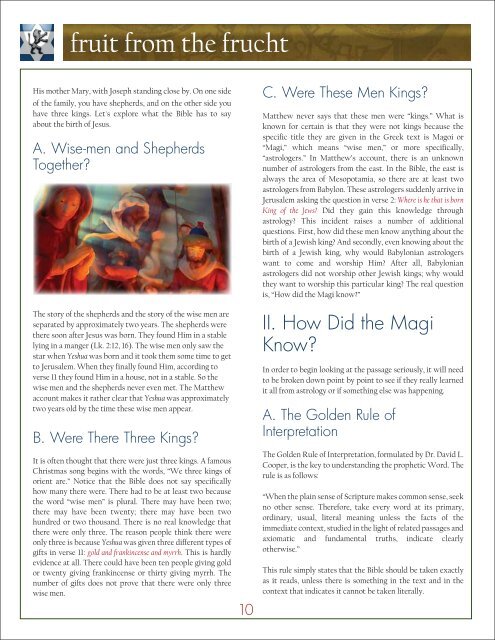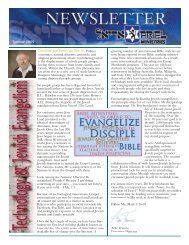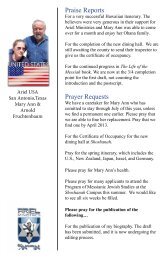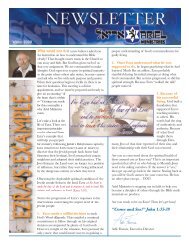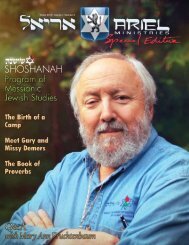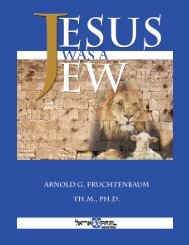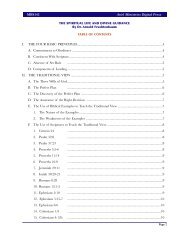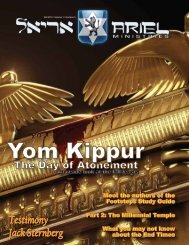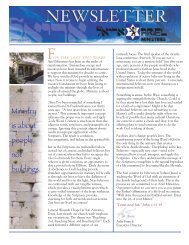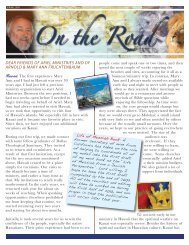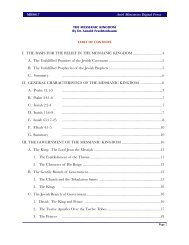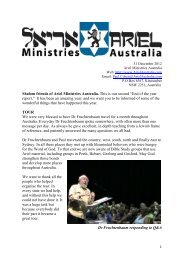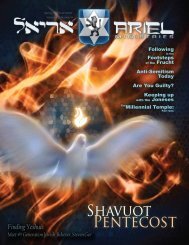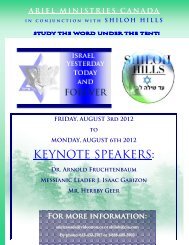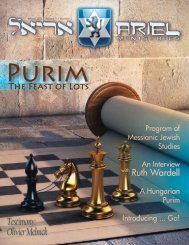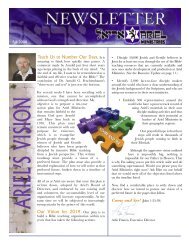My Hanukkah Story - Ariel Ministries
My Hanukkah Story - Ariel Ministries
My Hanukkah Story - Ariel Ministries
Create successful ePaper yourself
Turn your PDF publications into a flip-book with our unique Google optimized e-Paper software.
fruit from the frucht<br />
His mother Mary, with Joseph standing close by. On one side<br />
of the family, you have shepherds, and on the other side you<br />
have three kings. Let's explore what the Bible has to say<br />
about the birth of Jesus.<br />
A. Wise-men and Shepherds<br />
Together?<br />
The story of the shepherds and the story of the wise men are<br />
separated by approximately two years. The shepherds were<br />
there soon after Jesus was born. They found Him in a stable<br />
lying in a manger (Lk. 2:12, 16). The wise men only saw the<br />
star when Yeshua was born and it took them some time to get<br />
to Jerusalem. When they finally found Him, according to<br />
verse 11 they found Him in a house, not in a stable. So the<br />
wise men and the shepherds never even met. The Matthew<br />
account makes it rather clear that Yeshua was approximately<br />
two years old by the time these wise men appear.<br />
B. Were There Three Kings?<br />
It is often thought that there were just three kings. A famous<br />
Christmas song begins with the words, “We three kings of<br />
orient are.” Notice that the Bible does not say specifically<br />
how many there were. There had to be at least two because<br />
the word “wise men” is plural. There may have been two;<br />
there may have been twenty; there may have been two<br />
hundred or two thousand. There is no real knowledge that<br />
there were only three. The reason people think there were<br />
only three is because Yeshua was given three different types of<br />
gifts in verse 11: gold and frankincense and myrrh. This is hardly<br />
evidence at all. There could have been ten people giving gold<br />
or twenty giving frankincense or thirty giving myrrh. The<br />
number of gifts does not prove that there were only three<br />
wise men.<br />
10<br />
C. Were These Men Kings?<br />
Matthew never says that these men were “kings.” What is<br />
known for certain is that they were not kings because the<br />
specific title they are given in the Greek text is Magoi or<br />
“Magi,” which means “wise men,” or more specifically,<br />
“astrologers.” In Matthew’s account, there is an unknown<br />
number of astrologers from the east. In the Bible, the east is<br />
always the area of Mesopotamia, so there are at least two<br />
astrologers from Babylon. These astrologers suddenly arrive in<br />
Jerusalem asking the question in verse 2: Where is he that is born<br />
King of the Jews? Did they gain this knowledge through<br />
astrology? This incident raises a number of additional<br />
questions. First, how did these men know anything about the<br />
birth of a Jewish king? And secondly, even knowing about the<br />
birth of a Jewish king, why would Babylonian astrologers<br />
want to come and worship Him? After all, Babylonian<br />
astrologers did not worship other Jewish kings; why would<br />
they want to worship this particular king? The real question<br />
is, “How did the Magi know?”<br />
II. How Did the Magi<br />
Know?<br />
In order to begin looking at the passage seriously, it will need<br />
to be broken down point by point to see if they really learned<br />
it all from astrology or if something else was happening.<br />
A. The Golden Rule of<br />
Interpretation<br />
The Golden Rule of Interpretation, formulated by Dr. David L.<br />
Cooper, is the key to understanding the prophetic Word. The<br />
rule is as follows:<br />
“When the plain sense of Scripture makes common sense, seek<br />
no other sense. Therefore, take every word at its primary,<br />
ordinary, usual, literal meaning unless the facts of the<br />
immediate context, studied in the light of related passages and<br />
axiomatic and fundamental truths, indicate clearly<br />
otherwise.”<br />
This rule simply states that the Bible should be taken exactly<br />
as it reads, unless there is something in the text and in the<br />
context that indicates it cannot be taken literally.


